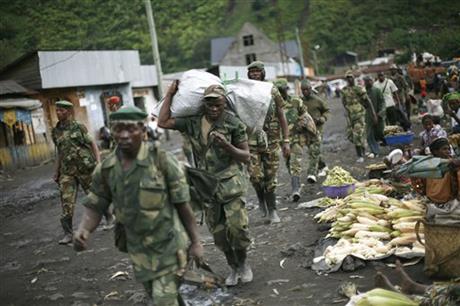
By RODNEY MUHUMUZA
FILE – In this Nov. 30, 2012 file photo, M23 rebels withdraw from the Masisi and Sake areas in the eastern Congo town of Sake, some 27 kms west of Goma, Congo. A Congolese rebel group whose fighters retreated into Uganda after being hammered by U.N.-backed Congolese government forces “can still regroup,” a Ugandan government spokesman said Tuesday, Nov. 12, 2013. The warning came after Congolese government officials delayed signing a peace accord with the insurgents. (AP Photo/Jerome Delay, File)
Congo Peace Accord
FILE – In this Sunday, Oct. 27, 2013 file photo, Congolese army soldiers march past a tank aimed towards Kibumba Hill, which was occupied by M23 rebels, around 25kms from the provincial capital Goma, in eastern Congo. A Congolese rebel group whose fighters retreated into Uganda after being hammered by U.N.-backed Congolese government forces “can still regroup,” a Ugandan government spokesman said Tuesday, Nov. 12, 2013. The warning came after Congolese government officials delayed signing a peace accord with the insurgents. (AP Photo/Joseph Kay, File)
Congo Peace Accord
FILE – In this Monday, Oct. 28, 2013 file photo, Congolese army soldiers march into Kibumba town after recapturing it from M23 rebels over the weekend, around 25km from the provincial capital Goma, in eastern Congo. A Congolese rebel group whose fighters retreated into Uganda after being hammered by U.N.-backed Congolese government forces “can still regroup,” a Ugandan government spokesman said Tuesday, Nov. 12, 2013. The warning came after Congolese government officials delayed signing a peace accord with the insurgents. (AP Photo/Joseph Kay, File)
Congo Peace Accord
FILE – In this Nov. 30, 2012 file photo, M23 rebels withdraw from the Masisi and Sake areas in eastern Congo. A Congolese rebel group whose fighters retreated into Uganda after being hammered by U.N.-backed Congolese government forces “can still regroup,” a Ugandan government spokesman said Tuesday, Nov. 12, 2013. The warning came after Congolese government officials delayed signing a peace accord with the insurgents. (AP Photo/Jerome Delay, File)
Prev
1 of 4
Next
KAMPALA, Uganda (AP) — A Congolese rebel group whose fighters retreated into Uganda after being hammered by U.N.-backed Congolese government forces “can still regroup,” a Ugandan government spokesman said Tuesday.
The warning came after the signing in Uganda of a peace agreement, scheduled for Monday evening, was postponed when Congolese officials asked for more time to review it. The development shows that stability for mineral-rich eastern Congo, where the rebellion ignited 1 ½ years ago and where other guerrilla groups also operate, remains elusive.
Ugandan officials with knowledge of the negotiations reported a breakdown of trust between Ugandan mediators and Congolese officials. Some members of Uganda’s military have supported the Congolese M23 rebels and the Rwandan government has provided even greater backing, according to a United Nations group of experts.
In negotiations convened after the rebels appeared to be losing the fight, the Congolese delegation said they could no longer hold face-to-face meetings with M23’s civilian leaders, said the Ugandan government spokesman, Ofwono Opondo.
“They don’t want to be seen to be equal to M23,” Opondo said.
Uganda’s deputy foreign minister, Okello Oryem, told reporters late Monday that Congo’s government was not comfortable with the idea of a “peace agreement” with M23, saying it instead wanted a “declaration” that M23 is a vanquished “negative force.”
Another apparent sticking point is the fate of the M23 military commander who recently fled with at least 1,665 of his fighters to Uganda amid a heightened offensive by Congolese government troops in neighboring eastern Congo. The U.N. has imposed a travel ban and assets freeze on Sultani Makenga, a former Congolese army colonel, for “serious violations of international law involving the targeting of women and children” as leader of M23. Congolese government officials want to see Makenga tried for his alleged crimes.
Opondo said Makenga “is not a prisoner” in Uganda and may only be handed over to Congolese authorities after a final peace accord has been signed.
U.S. special envoy Russ Feingold urged the parties to ensure that those who have committed war crimes, crimes of genocide and crimes against humanity will be held accountable. Feingold told The Associated Press on Monday that the peace deal offers no amnesty for rebels accused of committing serious crimes and no automatic reintegration of the rebels into the national army. Ugandan officials confirmed that the rebel delegation had accepted these conditions.
The Congolese government delegation to the Uganda talks is led by Foreign Minister Raymond Tshibanda. It was not possible to get his comment.
Makenga, 39, emerged as M23’s top commander earlier this year following a violent split within the rebel ranks that saw the ouster of Congolese warlord Bosco Ntaganda, who then fled to Rwanda before handing himself over to the International Criminal Court. Hundreds of M23 rebels allied with Ntaganda also fled to Rwanda at the time.
M23 launched its rebellion in April 2012, becoming the latest reincarnation of a Tutsi rebel group dissatisfied with the Congolese government. The rebels accused Congo’s government of failing to honor all the terms of a peace deal signed in March 2009 with M23’s precursor group, the CNDP.
At their peak the M23 rebels overtook Goma, a provincial capital in Congo. But in the past year they had been weakened by internal divisions and waning Rwandan support. The Congolese military capitalized on these rebel setbacks by pushing ahead with new offensives beginning in August that were supported by a brigade of U.N. military forces with a mandate to attack the rebels.



